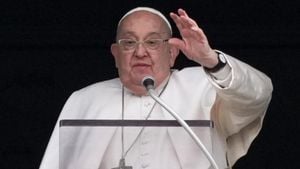The vibrant culture of Greece was showcased at this weekend's Antipodes Festival held in Melbourne, Australia, drawing crowds eager to celebrate their heritage. The festival not only serves as a display of Greek culture but embodies the rich multicultural fabric of Australian society. Attendees experienced everything from traditional Greek music and dance to authentic cuisine, immersing themselves in the customs of their forebears.
Dr. Andonis Piperoglou, Hellenic Senior Lecturer at the University of Melbourne, expressed his thoughts on the festival's significance as part of the larger multicultural expression within Australia. “This festival is more than just celebrating Greek culture; it exemplifies how cultures interact, blend, and reshape themselves within the diaspora,” he explained. “It's interesting to see how cultures influence each other when they're presented side by side on the streets of Melbourne.”
The Antipodes Festival springs from the rich traditions of the 1970s multicultural movement, representing the diverse expressions of Greek identity. According to Dr. Piperoglou, the festival serves as space for Greek identity to manifest, especially through food, dance, and shared cultural practices. “Greek culture is embodied, retained, and often reworked,” he noted, emphasizing the bodily expressions tied to cultural traditions.
Food stalls offering diverse cuisines, including popular Cypriot dishes, highlight the festival's aim to showcase the array of cultures within the Greek community. “Eating different foods and getting a taste of various cuisines reflect the diversity within the Greek-speaking world,” Dr. Piperoglou said.
Not only does the festival celebrate food and dance, but it opens discussions surrounding the fluidity of Greek identity. Dr. Piperoglou notes, “Greekness is not fixed—it’s constantly being reworked, retained, and sometimes even rejected. This embodied experience of culture allows us to reflect on what it means to be Greek outside of Greece.” Maintaining the Greek language amid generations of diasporic communities poses challenges, yet many younger individuals identify deeply with their Greek heritage, even if they do not speak fluent Greek.
“What parts of culture do we choose to retain?” Dr. Piperoglou posed, highlighting the conflicting experiences faced by the Greek diaspora. “Many live what I call ‘a healthy space of confusion,’ constantly negotiating what it means to be both Greek and Australian.”
Despite the apparent success of the Antipodes Festival, Dr. Piperoglou calls for greater institutional support for multiculturalism, stressing the importance of addressing challenges faced by third and fourth-generation Australians of Greek descent. “It’s not only about assisting migrants but also ensuring their descendants connect with their roots,” he contended.
This sentiment echoes at the upcoming Thessaloniki Documentary Festival, commencing from March 6 to 16, 2025. This festival will showcase 261 documentaries, including local and international premieres, providing insight and reflection on contemporary realities. The festival plays host to both online and physical screenings across various venues, offering audiences flexibility and accessibility.
A theme underscoring the documentary festival is the necessity of truth and transparency, especially amid rising misinformation and hostility. According to the festival's organizers, “The documentaries we present capture what we are experiencing today, urging viewers to engage with reality and appreciate the art of film.”
Dr. Piperoglou believes these cultural exchanges not only celebrate their origins but also act as catalysts for dialogue within the greater Australian demographic. He states, “When we share our stories and experiences, we find commonality and pave the way for mutual respect across cultures.”
The festival also positions itself as a platform pushing boundaries, featuring radical films and themes confronting the political tides of our time. “This year, we will focus on pieces pushing back on established narratives and exploring new perspectives,” the organizers mentioned.
Dr. Piperoglou states the festival transcends mere entertainment; it’s “a response to increase authoritarianism and rising hatred. It's important to remind audiences of our shared humanity through cultural expression.”
Further cultural events, such as exhibitions by photographers and artists, also permeate Australian cities, reinforcing the continuous legacy of Greek culture abroad. Events like the one featuring photographer Petros Kaminiotis at Luna Studio Sydney exemplify this cross-cultural engagement, inviting perspectives on the contemporary portrayal of cities like Athens, viewed from diasporic lenses.
The participation of renowned artists showcases the dynamism of modern Greek identity through visual art, challenging perceptions and preserving the heritage. Kaminiotis’ exhibit, themed, “The Modern Athens against the backdrop of antiquity,” opens broader conversations on identity adaptation within the diaspora.
With multiculturalism and cultural events like the Antipodes Festival and Thessaloniki Festival fostering dialogue and cultural exchange, the narrative of Greek identity continues to evolve. This demonstrates how heritage cultivates connection, identity, and community spirit, not just for Greeks but for all Australians.
Through embracing the richness of their background, Australians of Greek descent contribute significantly to the cultural mosaic, continually redefining what it means to be Greek today. Dr. Piperoglou brings attention to the unyielding adoption of tradition, stating, “Festivals like Antipodes and events like the Thessaloniki Documentaries position us to celebrate, reflect, and come together as we navigate our identities.”



